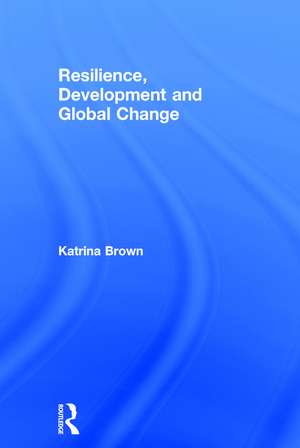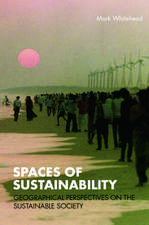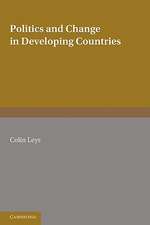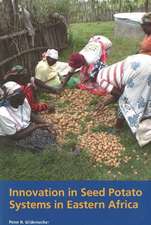Resilience, Development and Global Change
Autor Katrina Brownen Limba Engleză Hardback – 7 dec 2015
The book shows how current policy discourses on resilience promote business-as-usual rather than radical responses to change. But it argues that resilience can help understand and respond to the challenges of the contemporary age. These challenges are characterized by high uncertainty; globalized and interconnected systems; increasing disparities and limited choices. Resilience thinking can overturn orthodox approaches to international development dominated by modernization, aid dependency and a focus on economic growth and to global environmental change – characterized by technocratic approaches, market environmentalism and commoditization of ecosystem services.
Resilience, Development and Global Change presents a sophisticated, theoretically informed synthesis of resilience thinking across disciplines. It applies resilience ideas specifically to international development and relates resilience to core theories in development and shows how a radical, resilience-based approach to development might transform responses to climate change, to the dilemmas of managing forests and ecosystems, and to rural and urban poverty in the developing world. The book provides fresh perspectives for scholars of international development, environmental studies and geography and add new dimensions for those studying broader fields of ecology and society.
| Toate formatele și edițiile | Preț | Express |
|---|---|---|
| Paperback (1) | 340.37 lei 43-57 zile | |
| Taylor & Francis – 24 noi 2015 | 340.37 lei 43-57 zile | |
| Hardback (1) | 1108.37 lei 43-57 zile | |
| Taylor & Francis – 7 dec 2015 | 1108.37 lei 43-57 zile |
Preț: 1108.37 lei
Preț vechi: 1351.68 lei
-18% Nou
Puncte Express: 1663
Preț estimativ în valută:
212.11€ • 220.10$ • 177.29£
212.11€ • 220.10$ • 177.29£
Carte tipărită la comandă
Livrare economică 17-31 martie
Preluare comenzi: 021 569.72.76
Specificații
ISBN-13: 9780415663465
ISBN-10: 0415663466
Pagini: 228
Ilustrații: 18 black & white illustrations, 28 black & white tables, 1 black & white halftones, 17 black & white line drawings
Dimensiuni: 156 x 234 x 18 mm
Greutate: 0.43 kg
Ediția:1
Editura: Taylor & Francis
Colecția Routledge
Locul publicării:Oxford, United Kingdom
ISBN-10: 0415663466
Pagini: 228
Ilustrații: 18 black & white illustrations, 28 black & white tables, 1 black & white halftones, 17 black & white line drawings
Dimensiuni: 156 x 234 x 18 mm
Greutate: 0.43 kg
Ediția:1
Editura: Taylor & Francis
Colecția Routledge
Locul publicării:Oxford, United Kingdom
Public țintă
Postgraduate and UndergraduateCuprins
1. Resilience Now 2. Development Policy Engagement with Resilience 3. Resilience Across Disciplines 4. Exploring Experiential Resilience 5. Adaptation in a Changing Climate 6. Traps and Transformations: The Resilience of Poverty 7. Re-visioning Resilience: Resistance, Rootedness and Resourcefulness
Notă biografică
Katrina Brown is Professor of Social Sciences at the Environment and Sustainability Institute at the University of Exeter, based in Cornwall in the UK. She has a strong commitment to interdisciplinary analysis of, and innovative approaches to, environmental change and international development.
Recenzii
It was rewarding to read a book that discusses and illustrates resilience from so many perspectives. Researchers, students, policymakers and practitioners concerned with global change will appreciate Katrina Brown's re-visioning of resilience as an opportunity to collectively negotiate and influence current and future sustainabilities.
Professor Karen O'Brien, Department of Sociology and Human Geography, University of Oslo
This book provides an examination of the rise of resilience as a cross-disciplinary concept and framework within global development. The political ecology approach taken through the book provides a critical examination that links with contemporary debates in policy and practice around poverty and climate change. Populated with illuminating case studies, this is essential reading for anyone interested in truly sustainable development goals.
Dr Thomas Tanner, Head of Adaptation and Resilience, Overseas Development Institute (ODI), UK
With its bountiful exhibits of 18 figures, 28 tables, 18 text boxes, a useful glossary and hundreds of up to date and relevant references, this book is a crucial resource for lecturers and new resilience scholars... Books such as Resilience, Development and Global Change add value to knowledge in ways that tweets, brief journal papers and rambling websites will never be able to do. Just read it.
Christo Fabricius, Sustainability Research Unit Nelson Mandela University, South Africa
Professor Karen O'Brien, Department of Sociology and Human Geography, University of Oslo
This book provides an examination of the rise of resilience as a cross-disciplinary concept and framework within global development. The political ecology approach taken through the book provides a critical examination that links with contemporary debates in policy and practice around poverty and climate change. Populated with illuminating case studies, this is essential reading for anyone interested in truly sustainable development goals.
Dr Thomas Tanner, Head of Adaptation and Resilience, Overseas Development Institute (ODI), UK
With its bountiful exhibits of 18 figures, 28 tables, 18 text boxes, a useful glossary and hundreds of up to date and relevant references, this book is a crucial resource for lecturers and new resilience scholars... Books such as Resilience, Development and Global Change add value to knowledge in ways that tweets, brief journal papers and rambling websites will never be able to do. Just read it.
Christo Fabricius, Sustainability Research Unit Nelson Mandela University, South Africa
Descriere
Resilience, Development and Global Change presents a sophisticated, theoretically informed synthesis of resilience thinking across disciplines. It applies resilience ideas specifically to international development and relates resilience to core theories in development and shows how a radical, resilience-based approach to development might transform responses to climate change, to the dilemmas of managing forests and ecosystems, and to rural and urban poverty in the developing world.















